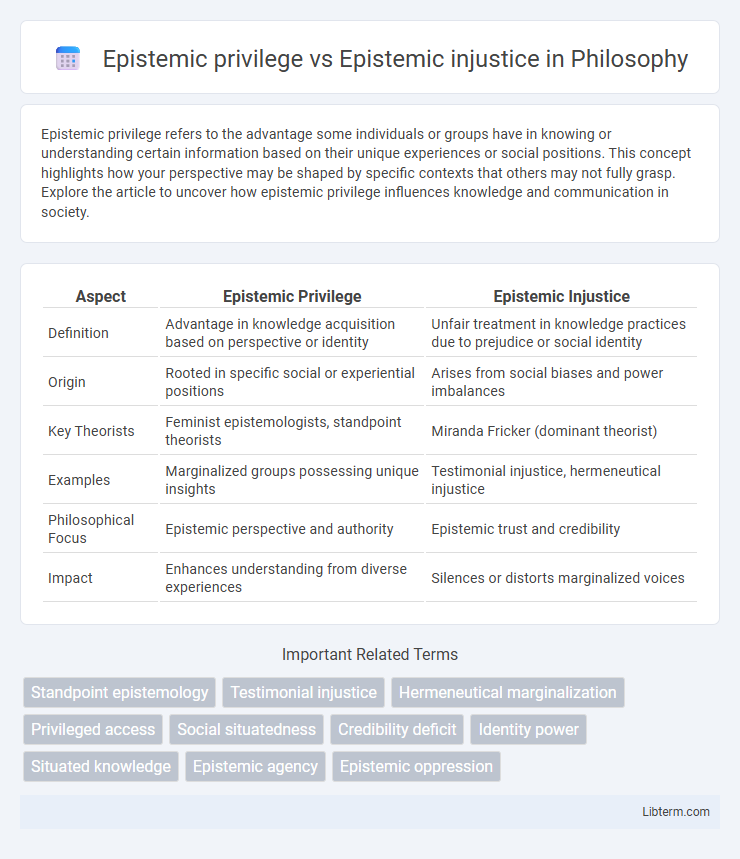Epistemic privilege refers to the advantage some individuals or groups have in knowing or understanding certain information based on their unique experiences or social positions. This concept highlights how your perspective may be shaped by specific contexts that others may not fully grasp. Explore the article to uncover how epistemic privilege influences knowledge and communication in society.
Table of Comparison
| Aspect | Epistemic Privilege | Epistemic Injustice |
|---|---|---|
| Definition | Advantage in knowledge acquisition based on perspective or identity | Unfair treatment in knowledge practices due to prejudice or social identity |
| Origin | Rooted in specific social or experiential positions | Arises from social biases and power imbalances |
| Key Theorists | Feminist epistemologists, standpoint theorists | Miranda Fricker (dominant theorist) |
| Examples | Marginalized groups possessing unique insights | Testimonial injustice, hermeneutical injustice |
| Philosophical Focus | Epistemic perspective and authority | Epistemic trust and credibility |
| Impact | Enhances understanding from diverse experiences | Silences or distorts marginalized voices |
Understanding Epistemic Privilege: Definition and Origins
Epistemic privilege refers to the advantage certain individuals or groups possess in accessing, interpreting, or possessing knowledge due to their social positions, experiences, or identities. This concept originates from feminist epistemology and critical race theory, emphasizing how marginalized communities often have unique insights inaccessible to dominant groups. Understanding epistemic privilege involves recognizing how power dynamics influence who is considered a credible knower within epistemic systems.
What is Epistemic Injustice? Types and Examples
Epistemic injustice occurs when individuals are wronged specifically in their capacity as knowers, resulting in unfair treatment related to knowledge or credibility. Two primary types are testimonial injustice, where a speaker's word is given less credibility due to prejudice, and hermeneutical injustice, which arises when a gap in collective interpretive resources unfairly disadvantages someone in making sense of their social experiences. For example, a woman's reports of discrimination may be dismissed (testimonial injustice), or marginalized groups may lack the concepts to articulate their oppression due to societal blind spots (hermeneutical injustice).
Key Differences Between Epistemic Privilege and Injustice
Epistemic privilege refers to the advantageous position of having greater access to knowledge or interpretative frameworks due to social positioning or identity, while epistemic injustice involves wrongs done to individuals in their capacity as knowers, such as testimonial injustice or hermeneutical injustice. Key differences include that epistemic privilege often results in enhanced epistemic agency and credibility, whereas epistemic injustice results in diminished credibility and exclusion from knowledge production. The former highlights asymmetries in epistemic advantage, while the latter focuses on the harms caused by such asymmetries in social epistemology.
Epistemic Power Dynamics in Society
Epistemic privilege refers to the advantages certain groups hold in knowledge production and validation due to social positioning, enabling disproportionate influence over what is considered true or credible. Epistemic injustice occurs when marginalized groups are unfairly discredited or excluded from contributing to collective knowledge, reinforcing systemic power imbalances. These epistemic power dynamics in society perpetuate inequalities by privileging dominant voices and silencing others, impacting social, political, and cultural recognition.
Marginalization and Silenced Voices in Knowledge Production
Epistemic privilege refers to the advantages certain groups hold in knowledge production due to social positioning, while epistemic injustice occurs when marginalized voices are systematically silenced or discredited. Marginalization in epistemology highlights how dominant groups control narratives, excluding underrepresented communities from contributing to or shaping knowledge. Addressing epistemic injustice involves recognizing and amplifying these silenced perspectives to achieve more inclusive and equitable knowledge systems.
Structural Roots of Epistemic Injustice
Epistemic injustice arises from structural power imbalances that systematically marginalize certain groups' knowledge and experiences, often rooted in social hierarchies and institutional biases. Epistemic privilege refers to the advantageous position individuals or groups hold in knowledge production, enabling them to shape dominant narratives while excluding others. Addressing the structural roots of epistemic injustice involves recognizing and dismantling these embedded inequalities in epistemic authority and testimonial credibility.
The Role of Identity in Epistemic Privilege
Epistemic privilege arises when individuals, by virtue of their social identities such as race, gender, or class, possess unique knowledge or perspectives inaccessible to others, enabling them to critically challenge dominant narratives. This privilege underscores how marginalized groups often have epistemic insight into systemic injustices overlooked by privileged groups. In contrast, epistemic injustice occurs when these groups are dismissed or discredited, highlighting the critical role identity plays in both enabling epistemic privilege and exposing vulnerabilities within knowledge practices.
Impacts of Epistemic Injustice on Marginalized Groups
Epistemic injustice undermines the credibility and knowledge contributions of marginalized groups by systematically devaluing their experiences and testimonies, leading to exclusion from important social, political, and academic discourses. This injustice perpetuates social inequalities by limiting access to epistemic resources essential for empowerment and decision-making. The resulting epistemic marginalization reinforces structural oppression and hinders efforts toward equity and inclusion.
Strategies for Promoting Epistemic Justice
Strategies for promoting epistemic justice emphasize amplifying marginalized voices and recognizing diverse epistemic contributions, addressing power imbalances inherent in epistemic privilege. Implementing inclusive dialogue frameworks and critical reflexivity in knowledge practices counters epistemic injustice by validating different standpoints and experiences. Educational reforms and institutional policies fostering equity in knowledge production further dismantle structural barriers to epistemic fairness.
Building Inclusive and Equitable Knowledge Systems
Epistemic privilege refers to the advantage certain groups have in knowledge production due to their social position, while epistemic injustice occurs when marginalized groups are wrongly discredited or excluded from knowledge processes. Building inclusive and equitable knowledge systems requires recognizing and addressing these imbalances by valuing diverse perspectives and ensuring fair access to epistemic resources. Implementing participatory methodologies and promoting epistemic humility are key strategies for fostering justice and inclusivity in knowledge institutions.
Epistemic privilege Infographic

 libterm.com
libterm.com